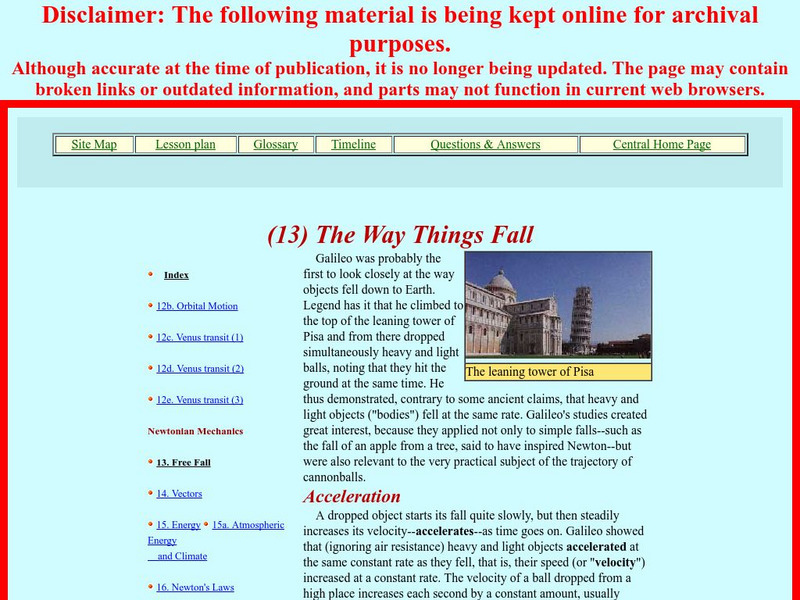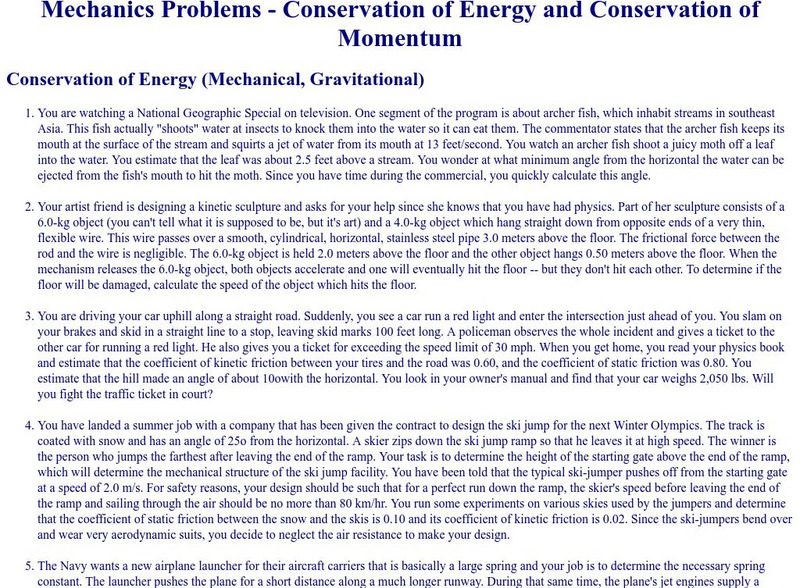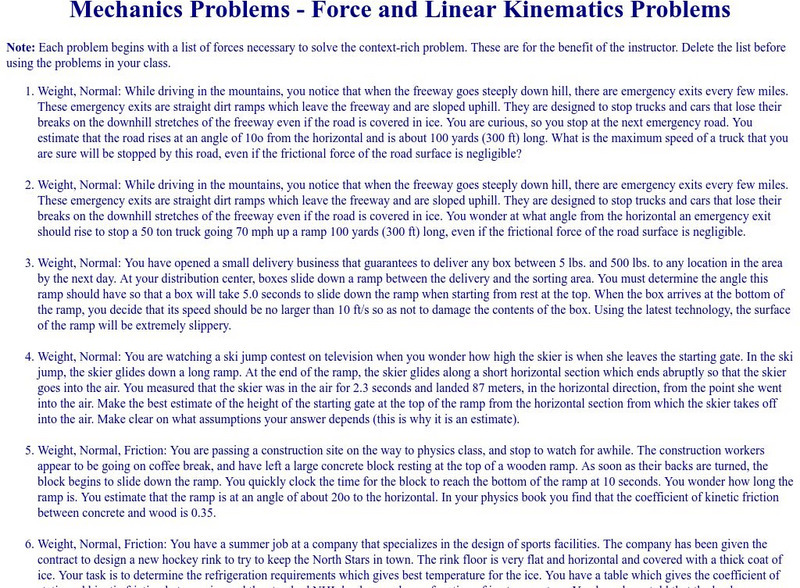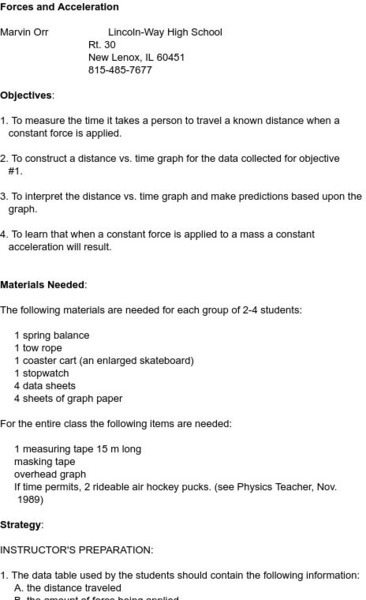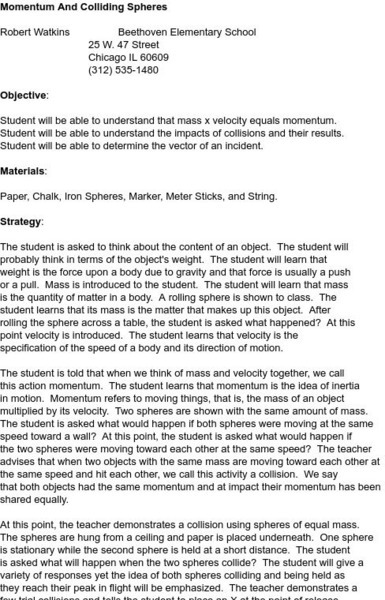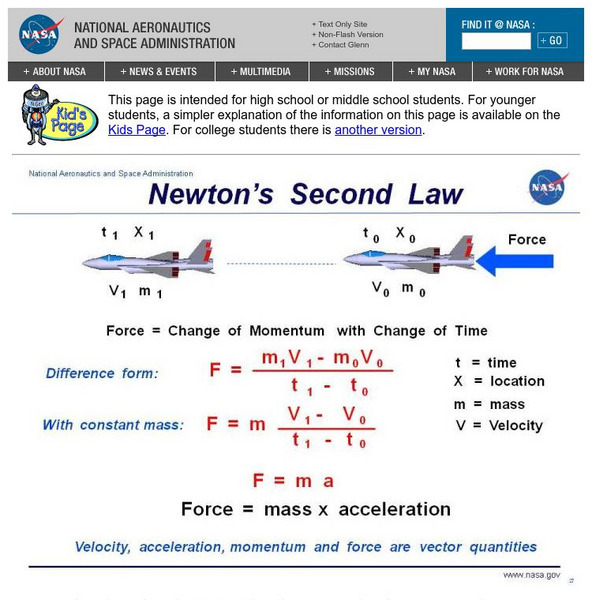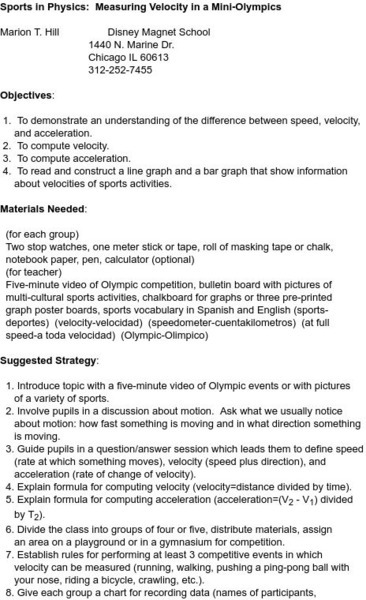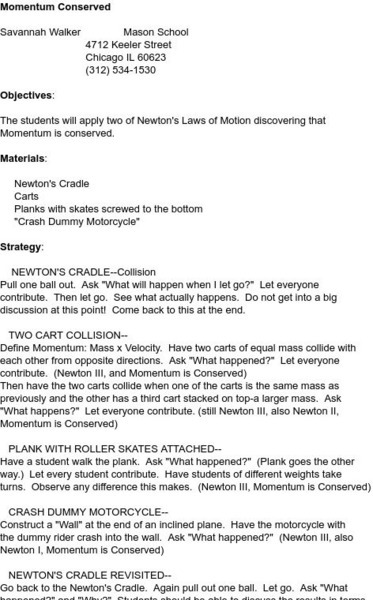Physics4kids
Physics4 kids.com: Velocity, Motion and Speed Oh My
This brief overview distinguishes speed and velocity. Vectors are explained along with acceleration and gravitation. Diagrams are used to help explain these concepts.
NASA
Nasa: The Way Things Fall
This site from NASA compares free falling motion to falling with air resistance. Discusses Galileo's experiment. Explains why we believe all objects free fall with the same acceleration.
Physics Classroom
The Physics Classroom: 1 Dimensional Kinematics
An activity in which average speed is calculated for a ball sliding along an inclined plane. This speed is compared to various instantaneous speeds along the incline.
University of Minnesota
University of Minnesota: Conservation of Momentum
This site provides a set of four Physics problems dealing with the conservation of momentum principle.
Annenberg Foundation
Annenberg Learner: Amusement Park Physics: The Principles of Free Fall
An article describing free fall principles in roller coaster rides. In addition to the explanation of free fall, an experiment is described that allows you to test free fall with a cup of water. Part of a larger presentation on roller...
Michigan Reach Out
Nasa: Soda Pop Can Hero Engine
Students explore all three parts of Newton's Laws of Motion by observing a spinning pop can.
Other
Ask Numbers: Measurement Conversion Calculators and Charts
What kind of unit conversion would you like to do? This site will allow you to do a multitude of conversions. Just click on the specific measurement you are needing to convert. It also provides a history of measurements and a chart of...
University of Minnesota
University of Minnesota: Mechanics Problems: Force and Linear Kinematics Problem
This University of Minnesota site provides a series of contextually rich problems pertaining to force, Newton's second law of motion, and linear kinematics.
Walter Fendt
Walter Fendt: Projectile Motion
A short interactive activity to show the movement of a projectile. You can change the values of the initial height, velocity, angle of inclination, the mass and the gravitational acceleration.
Walter Fendt
Walter Fendt: Movimiento Con Aceleracion Constante
A short interactive activity which allows you to visualize a constant acceleration. You can modify the initial position, the initial velocity and the acceleration.
Department of Defense
Do Dea: Free Fall Constants for Earth
When you work with equations that show position, velocity, acceleration of objects that are flying or falling through the air, you will be using the constant that is the acceleration due to gravity. View formulas, explanations, and...
Department of Defense
Do Dea: Instantaneous Rates of Change
Prepare for the AP Calculus exam by reviewing the most common relationships that are used in calculus. Formulas and examples are provided.
Science4Fun
Science4 Fun: Acceleration
What is acceleration? Brief article discusses how it is measured, deceleration, and gravity.
Other
Socratic: What Is an Acceleration vs Time Graph?
Explains how to construct and interpret an acceleration vs. time graph, and how it would relate to a velocity vs. time graph or a position vs. time graph.
Physics Classroom
The Physics Classroom: Acceleration
A GIF animation comparing the motion of three cars. A graphical depiction is given. Includes three thoughtful questions with answers in a pop-up menu.
Calculator Soup
Calculator Soup: Velocity Calculator
This velocity calculator uses the equation that the final velocity of an object is equal to its initial velocity added to its acceleration multiplied by time of travel. This calculator does assume constant acceleration during the time...
Calculator Soup
Calculator Soup: Acceleration Conversion Calculator
Convert units of acceleration by entering the value to convert and the from and to units.
Bill Nye
Bill Nye: Falling for Science
Try this at-home science experiment to learn about acceleration due to gravity.
Science and Mathematics Initiative for Learning Enhancement (SMILE)
Smile: Lab Work Forces & Acceleration
The Illinois Institute of Technology provides this site. The site contains a graphing activity which illustrates that a constant force exerted upon an object results in constant acceleration. Rolling carts and stopwatches are used to...
Science and Mathematics Initiative for Learning Enhancement (SMILE)
Smile: Colliding Spheres
This lab activity from the Illinois Institute of Technology lets students investigate the impact of collisions upon the velocity and momentum of the colliding objects. Requires understanding of vectors.
NASA
Nasa: Beginner's Guide to Aerodynamics
This site from NASA provides a graphic depicting Newton's second law. Graphic is accompanied by an explanation. Part of a larger site with additional information on Newton's laws.
Science and Mathematics Initiative for Learning Enhancement (SMILE)
Smile: Sports in Physics: Measuring Velocity in a Mini Olympic
The Illinois Institute of Technology provides this site on Physics. It is a student lab investigation in which students compare the concept and quantity of velocity to that of acceleration. Includes directions, ideas for assessment, a...
Science and Mathematics Initiative for Learning Enhancement (SMILE)
Smile: Momentum Conserved
This site by the Illinois Institute of Technology gives a Lab activity in which young scholars use a variety of toys to discover Newton's second law and momentum conservation. Newton's cradle, skate boards, and a toy motorcycle are...



